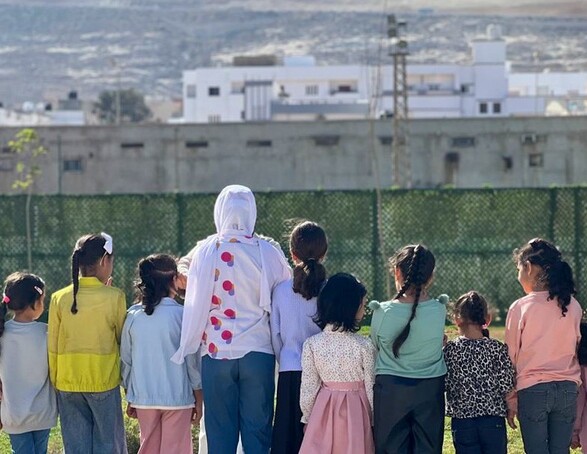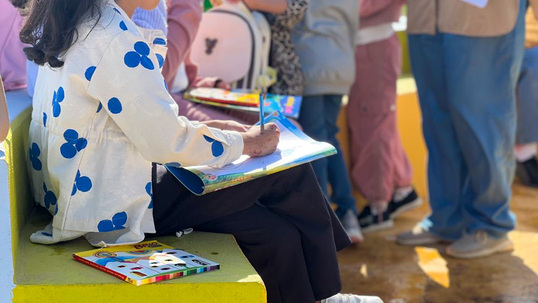In the aftermath of devastating floods in Derna, Acted launched the project “Providing a Child Protection and Education in Emergencies Relief Response to Flood Affected Populations in North-Eastern Libya”. Supported by Islamic Relief and the Scottish Government, the project sought to provide psychosocial wellbeing recovery support to flood-affected children through recreational activities and psychosocial support kits, as well as to enhance the quality of education through provision of educational material. Through the initiative, a total of 214 children participated in recreational psychosocial support activities and 230 children, including 30 children with disabilities, received individual psychosocial support kits. Additionally, educational materials were distributed to seven schools in Derna, benefiting 3,478 children and 914 teachers.

The floods in Derna caused widespread trauma among children, leaving them in need of emotional support. Recognizing this, Acted implemented recreational activities which give children opportunities to play, express themselves, relax and interact with peers and facilitators. This activity can provide children with the tools, network, and platform to overcome trauma, stress, anxiety, and to foster wellbeing.
The recreational activities are led by facilitators, who play a crucial role in ensuring the activities create a nurturing and supportive environment for the children. Facilitators Amina, Ahmed, Omar, and Khaled used creativity and inclusivity to assist children’s recovery in Derna.
Creativity and connection in emotional recovery
Amina, a 21-year-old economics student, leveraged her background in scouting to lead creative workshops that helped children articulate their emotions through art.
One child drew a picture of a house on a hill surrounded by sunshine. When I asked her about it, she said it was where she imagined feeling safe again.
Art gave them an outlet to explore their feelings in a safe way, seeing their smiles and hearing their stories was a reminder of the power of creativity in healing.
Every painting and drawing brought a little more light into their lives.
Amina shared and continued: “Art gave them an outlet to explore their feelings in a safe way, seeing their smiles and hearing their stories was a reminder of the power of creativity in healing.” She also noted the transformative impact on children’s confidence, saying: “Every painting and drawing brought a little more light into their lives.”
Ahmed, a 27-year-old facilitator with a scouting background, focused on ensuring that every child felt included. Using storytelling as a core tool, Ahmed created sessions where children could weave their experiences into fictional narratives, helping them process their trauma indirectly. “Many of them used these stories to express fears and hopes they couldn’t otherwise articulate,” he explained. Ahmed also ensured children with disabilities were fully integrated into activities. “Inclusivity is critical,” he said. “We adjusted games and art projects to ensure every child could participate, fostering a sense of belonging.”
Amina and Ahmed often collaborated to combine their strengths in creativity and inclusivity. Together, they organized group sessions that alternated between artistic expression and physical play, ensuring children experienced a balance of emotional release and active engagement. They also provided consistent emotional support, listening to children’s concerns and offering encouragement. “One child told me she felt safe in our sessions because we didn’t rush her to speak or act,” Ahmed shared.
Building confidence through sports and emotional support
Omar, a 24-year-old engineer and facilitator, saw sports as a gateway to healing. “Physical activity helps children release pent-up energy and find joy again,” he explained. Omar organized football matches, relay races, and team-building games that encouraged cooperation and boosted self-esteem. “Many of these children hadn’t smiled in weeks, but during a football game, you’d see them laughing and cheering,” he recalled.
He also introduced incremental challenges to help children overcome their fears. “Some were hesitant to join group activities at first, so we started with simple tasks, like passing a ball, and built from there,” Omar shared.
Khaled, a seasoned facilitator, complemented Omar’s active approach with a focus on emotional stability. He created safe spaces for children to share their feelings through guided storytelling and journaling.
We gave them time and space to process their emotions at their own pace
He also adapted activities for children with disabilities, ensuring they felt included. “When children with special needs are supported, it shows the group that everyone matters,” he said. Khaled often worked one-on-one with children struggling to articulate their feelings, offering gentle encouragement and guidance. “Sometimes, just sitting next to them quietly was enough to make them feel supported,” he said.
Omar and Khaled collaborated on integrating emotional support into physical activities, making sure that children felt safe, heard, and engaged. They balanced active play with reflective moments, helping children build confidence while processing their emotions. “One boy was initially too shy to join the group,” Omar noted. “But with Khaled’s support during quieter moments, he eventually became one of the most enthusiastic players.”

Acted’s project, supported by Islamic Relief and the Scottish Government, has significantly contributed to the emotional recovery of Derna’s children. Facilitators like Amina, Ahmed, Omar, and Khaled have left a lasting impact through their creative and inclusive methods. The continuation of recreational activities will help children rebuild their confidence and find a sense of belonging, demonstrating the transformative power of holistic recovery efforts.